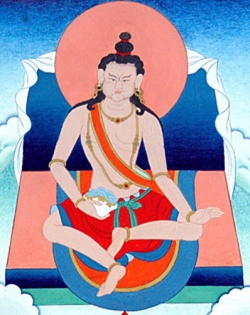Râhula (11th century)
The Mahasiddha Rahula Gupta (also named Rahula-guhya-vajra) is quite known in Tibetan buddhism for he was one of the main master Atisha. Rahula also contributed to the Shangpa lineage with some Chadrupa practices and the Integrated Practice of the Four Deities (lhachi drildrup).
Rahula was born in the 10th century in the town of Bhiraji, among an aristocratic family. Until the age of twenty, he trained in the sacred teachings. At twenty one, he suffered pain from a vajra thorn. According to Taranatha, “it is said that [this trial] purified the obcuration incurred from having disobeyed his master’s command”. The four deities blessed him and told him that his illness would exhaust his previous bad karma and foretold that he would go to the celestial realms in this lifetime.
When he meditated on the profound tantras’ meaning, his spiritual master encouraged him to engage in avadhuti conduct. But because of his pride in his learning made him delay. Later, he practiced single-mindedly but couldn’t reach accomplishment. The he followed the advice of the master Guna-akara and cut his tongue and limbs with a razor. At that moment he got the vision of the four deities : Vajra Yogini, Noble Tara, Protector Chadrupa and Chenrezi. Then he followed the advice of Jnana Sagara and submerged himself in water for seven days. Leeches sucked his blood and he nearly died, completely exhausting hi karmic obscurations.
Concerning the meeting of Atisha and Rahula, Atisha’s master, Avadhutipa, sent the young prince to the master Rahulagupta, on the Black Mountain, to enter the practice of tantra. Atisha arrived with all his horsemen and told this vajra master how he had studied with many teachers, but still was unable to shake off his bondage to royal life. Rahulagupta conferred upon him his first empowerment, which was into the practice of Hevajra. He then sent him back to the palace with eight of his disciples, four male and four female, dressed scantily in the bone ornaments of mahasiddhas, great adepts with actual attainments.
After having practiced for some time, Atisha’s vajra master Rahulagupta told him, “It does not mat-
ter how many pure visions you receive, you must train to develop caring love, compassionate sympathy, and a bo-dhichitta aim totally dedicated to benefiting others and to achieving enlightenment.” He advised him to commit him-elf wholeheartedly to Avalokiteshvara, to bond his mind closely with him and work to become enlightened so that he could best free everyone from samsara. Only with this achievement would he realize his fullest potential.
By the way of his miraculous powers, Rahula also came to visite Khyungpo Naljor in Tibet. Manifesting wondrous feasts, he bestowed on him various profound instructions and teachings, beginning with the blessing of the four deities.
On the perfectly stable vajra ground in the south, Rahula renounced distraction and established his place of meditation. He attained the sublime accomplishment of Mahamudra and the state of Vajradhara. It is said that he dwells in a vajra body on the wooded hill known as Black Mountain.
